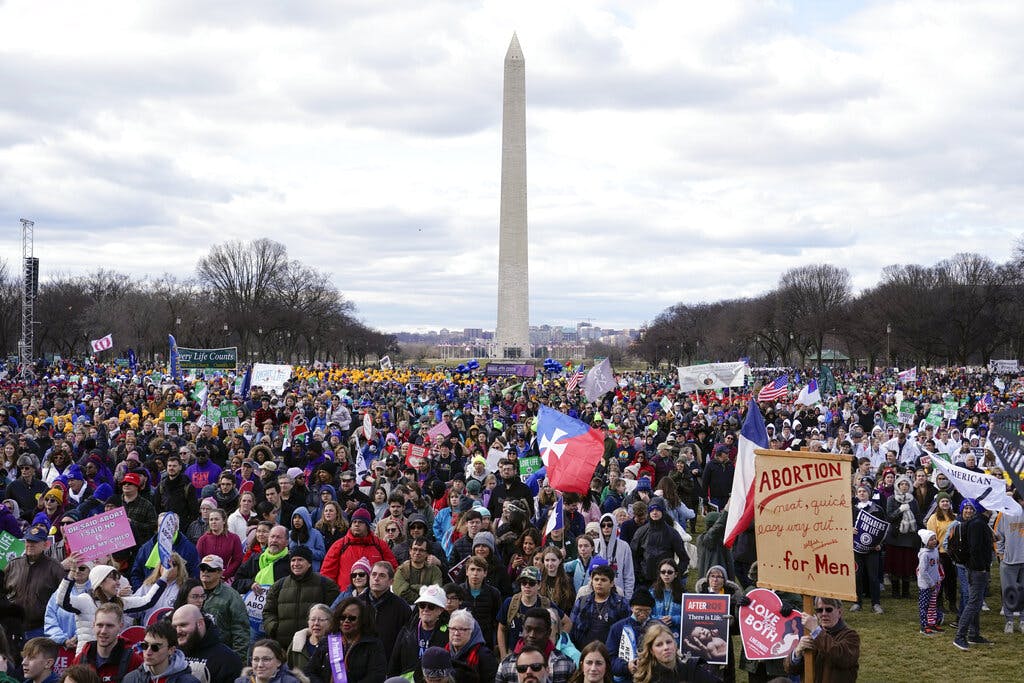In the Post-Roe Era, Movement Against Abortion Is Attracting Surprising Support
Orthodox Jewry is starting to emerge as a strand of the cause being marked at the nation’s capital with the March for Life.

An Orthodox Jewish teacher, Rabbi Mark Gottlieb, is organizing a Shabbat gathering Friday for his co-religionists attending the March for Life at Washington.
The annual March for Life this year signals a turn in a new direction for the movement of opponents to legalized abortion. During the 50 years since the march began, the central demand of demonstrators has been to overturn the Supreme Court ruling, Roe v. Wade, that found in the Constitution a right to abortion.
This year, with that demand met in Dobbs. v. Jackson, the “pro-life” movement is at a crossroads. “It’s almost like the old wild, wild West … everything is still shaking out,” the president of the National Right to Life Committee, Carol Tobias, told the Associated Press.
Enter Rabbi Gottlieb, who calls the current moment an “opportune time” for his co-religionists to enter the anti-abortion movement in a formal way, and he credits the decision in Dobbs. “It was really after the Dobbs decision that I felt there was an opportunity here,” Rabbi Gottlieb told the Sun. “I read something by Rabbi J.D. Bleich — a real noted halakhic authority and contemporary posek,” using the Hebrew term for a Jewish legal decisor.
It would be a mistake to overestimate the significance of the Jewish entry into the movement. So far the number of Jews is tiny. It would also be a mistake, though, to write it off. What the Supreme Court decided in Dobbs was that the question of abortion should be returned to the political arena. In this, the Jewish strand in American life could be significant.
“Catholics had been carrying the ball on the issue of right to life and the moral problematic of abortion on-demand,” Rabbi Gottlieb says. “Orthodox Jews should firmly stand shoulder to shoulder with Catholics and other Christians who have been really paying attention to this issue for all these years.”
Rabbi Gottlieb distinguishes between the Catholic and Jewish legal positions, particularly on the question of whether life begins at conception. Jewish organizations that represent liberal constituencies have often presented an image of a religion that supports a liberal abortion regime, relying on cases in Jewish law that mandate abortions when the pregnancy poses a fatal risk to the mother.
In Dobbs, several Jewish groups filed amicus briefs in favor of both the plaintiffs and the defendants. More Jewish groups, however, expressed support for the anti-abortion side than in previous reconsiderations of Roe.
In the 1989 Webster v. Reproductive Health Services, the Agudath Israel of America, which represents fervently Orthodox Jewry, was the sole Jewish institutional voice in opposition to abortion on-demand in that case. In 2011, the executive director of the Aguda, Rabbi Chaim Dovid Zweibel, appeared with several members of the Christian clergy at a press conference to draw attention to the staggering rate at which abortions were being performed in New York.
Yet the Jewish community is divided. A liberal South Florida synagogue is suing the Sunshine State in federal court over recently enacted abortion restrictions, saying that such restrictions violate its congregants’ rights to free exercise. Even some Orthodox Jews have made similar claims.
“Observant, halakhic Jews sometimes get caught in the trees and lose sight of the forest,” Rabbi Gottlieb says. “While it’s true that halakha permits, and mandates even, abortion in some extremely rare circumstances, the overwhelming number of cases that America has seen has been governed by a much more liberal abortion mentality that is deeply at odds with Jewish tradition.”
“It’s important for Jews at this time not to back down from the traditional Jewish position that life is a gift,” Rabbi Gottlieb says, noting that abortion, under certain circumstances, can be considered manslaughter or even murder in Jewish law.
Rabbi Gottlieb, who is not attending the march, says he is less interested in the legislative issues and more interested in the “cultural conflict” over the importance of life in the American mindset.
“Does human life have dignity that’s inviolable?” Rabbi Gottlieb poses, questioning a society that “sees life as so disposable” if “convenience or economic considerations” can outweigh it.
Rabbi Gottlieb notes this question “bleeds into” other social issues where Jews have expressed more vocal opposition, like euthanasia and assisted suicide. “I think Jews need to have a renewed sense of urgency, especially in the wake of Dobbs.”
The sabbath program Rabbi Gottlieb has brought together is part of a conference for conservative college students hosted by the David Network at the Museum of the Bible. The conference will feature Christian, Jewish, Hindu, and Muslim speakers on relevant cultural issues.
“[T]he battle to build a culture of life is far from over,” the president of the March for Life, Jeanne Mancini, said in an interview with the Associated Press. “March for Life will continue to advocate for the unborn and policies that protect them until abortion becomes unthinkable.”

